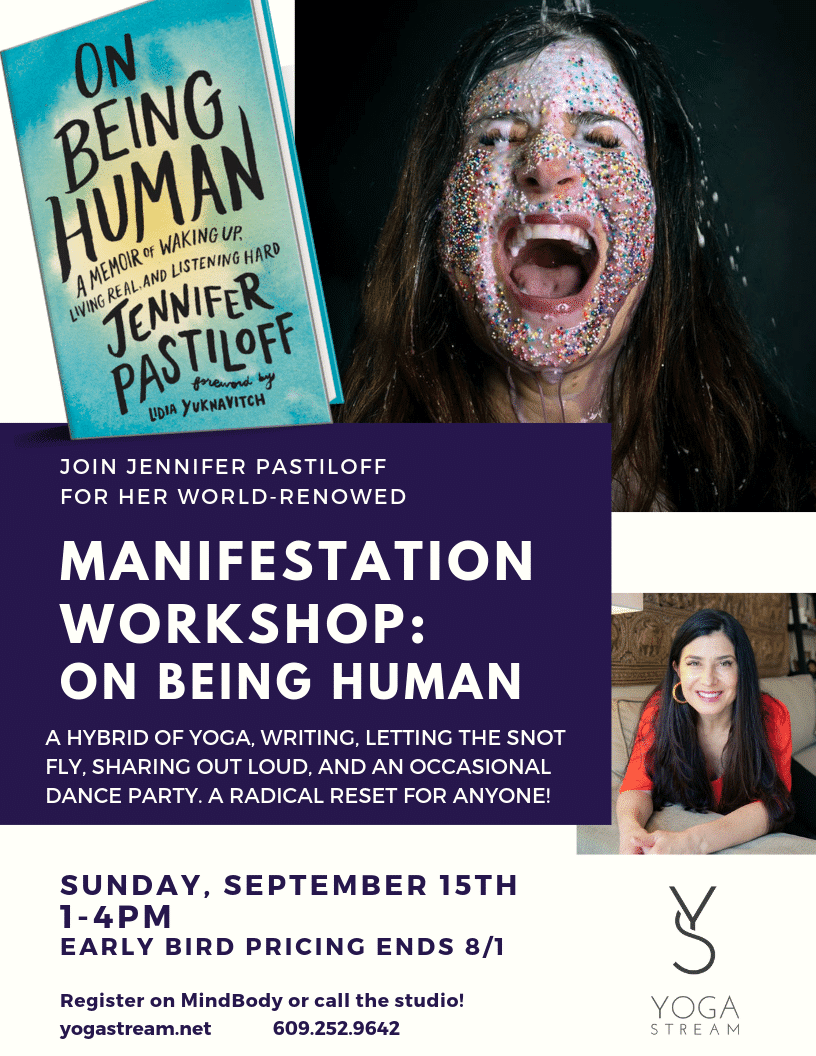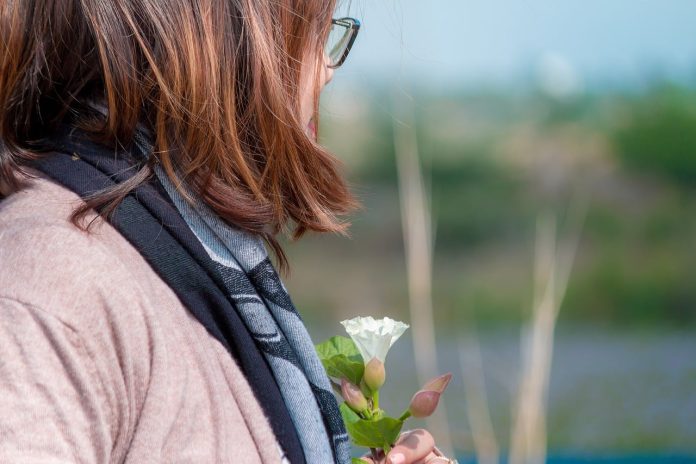By Marni Berger
The gloom of the world is but a shadow. Behind it, yet within our reach, is joy. Take joy!
From “Letter to a Friend” by Fra Giovanni, 1513
When I was eighteen, my grief over the death of my grandmother, who was like a second mother to me, manifested in cutting. I began cutting my arms and legs and thinking of dying. I didn’t want to die, really, so I didn’t go too far, but I’d sit alone in my room and carve away with one of the dull steak knives we had in the drawer, or the Swiss Army Knife my oldest brother brought me from his first study abroad trip, whose adventures I remember made him so happy to retell. I’d watch the blood come out like beads, so small, but so clear that something was hurting me.
I had made friends, in high school and the summer after starting college, with other intense souls who did similar things to themselves, and we fell in love with each other in a friendship sort of way. There are two sweet friends who come to mind now, pale-faced, full of light. With one, I spent a summer drinking smoothies and iced coffee and imagining how the English language sounded to someone who didn’t speak it while cracking up on too much caffeine and dreaming of kissing boys; the other taught me to juggle with a few hacky sacks I kept in my room, and I dreamed of kissing him. No one understands me, we said to each other often. But you. They both died in the span of five years, one drowned, an accident. But I raged when my second friend died, when I found out she had hanged herself. I was living in New York City, not far from where her body had gone unnoticed for days, and bloodied myself worse than before, so now I have scars.
No one understands me, but you.
***
Meeting my husband when I was twenty-one was a recalibration. We fell in love, and went on hikes, and long walks in New York, and searched for doughnuts and cheap Bloody Marys all around the city, while people-watching, making fun of someone carrying around dog-litter, and saying only in New York; and I wrote poems about it all, trying to be like Frank O’Hara, but also just trying to record the time. I was still cutting myself, and Leo said, “You’re like a tortured genius,” which was dangerously romanticizing the situation, but also was the only thing I’d ever heard that made me unashamed of my pain. Who doesn’t want to be called a genius? “I just want to be a genius, though!” I said, “not the tortured part.” We laughed.
I’d been in therapy for years by the time I was twenty-one, and though I didn’t believe I had anything to give anyone, the intervals between episodes were decreasing and not only because of meeting Leo, a true partner. I had been accepted into Columbia University’s MFA writing program, the nonfiction concentration, where I would begin to amass a debt that will trail me a lifetime—unless I some day win the lottery or amass the success of Jonathan Safran Foer (a Venn Diagram of Chance with an overlap, I’m sure)—and where I immediately wrote about my grandmother. She would take her grandchildren on scavenger hunts in the night when we were only one, two, three, four, five, and even fifteen years old, as a break from our hectic lives with our own parents. My cousins and I had mothers absorbed in painfully deteriorating love lives, and Grammy showed us the freedom of our own imaginations. We saw lights twinkling in the dark in the deep woods and believed they were fairies. I believed Grammy was magic.
Losing my grandmother had felt like losing all joy and safety.
Isn’t memoir-writing so selfish, someone very close to me said on a hike while I wrote about my grandmother, the fairies, and the cutting, in the form of a memoir at Columbia. I just can’t think of anything more like naval-gazing. Can you? she asked me. It was a beautiful day. I can’t remember how the topic even came up. What are you writing about at school? she then asked. She was older than me. I looked up to her. Her face was bright and earnest. You can tell me, she said. I looked at the leaves beneath my feet. I didn’t tell her or anyone except Leo or other writers. The healing itself was as secretive as the pain.
Years later, I realize now, my memoir-writing was selfish. In writing about my childhood, and grief, I claimed myself. I took my own life without ending it.
***
There is no quick fix when it comes to melancholy, and I still tip in its direction. I didn’t take medication during debilitating morning sickness, known as hyperemesis gravidarum that kept me from a dream job (and most certainly resurfaced after the most recent presidential election); I didn’t correct a midwife who told me “we’d all prefer to sit on the couch all day during the first trimester but some of us have to work” after I told her I couldn’t move without vomiting. I didn’t use anesthesia when I gave birth to my daughter—It feels like you are being skinned from the inside, I had read somewhere before I gave birth. No way, I thought. It can’t. Or else no one would have “natural births.” Well, it felt exactly like being skinned from the inside, likely because that’s partly what giving birth entails.
Still, I’m learning I can take up space, even if, after all this time, it isn’t my honest instinct to do so.
***
The gloom of the world is but a shadow. Behind it, yet within our reach, is joy. My grandmother gave that quote to all of her kids in the form of a poster, and when I was a kid I saw it often, but I didn’t understand it. I used to think that good and evil battled, and that, one day, one would win. I spent my childhood fearing that good would always lose.
I panicked evil would win again soon after the election, pregnant; after all, it seemed like it had. Our president could, I thought, take out my baby with a single code that could start a nuclear war. What could love do in the face of nukes?
“What good are we doing?” I said to my husband, “if we can’t fully protect our own baby?”
“We can’t fully protect her,” he said, “but what we’re doing isn’t nothing.”
***
The baby just over one year old and the days are totally full. Each is a blur of coffee and books and giggles and exhaustion and new words and fresh air and fresh poop and so much laundry and sleep deprivation that feels like starvation and helpful people and annoying people and my resentment and my joy and days at the beach and the baby learning how to kiss with her whole head and bringing me books and opening them herself miraculously, and garbling words that must make sense to someone because she says them so earnestly; her laughter that comes from her staring at me and me saying, having no idea what else to say but “who me?” jokingly, and her cracking up again and again and again each time I say it.
“How do I know when to stop doing the thing that makes her laugh?” I ask my mom one day. “I could be saying who me forever,” I joke.
“You never stop trying to make her laugh,” my mom says, smiling.
***
Take joy… In early spring this year, I saw the flowers growing out of the dirt in my neighbor’s yard one day. And the baby was laughing while holding a stick on our walk. And our dog was rolling in the dirt-encrusted snowdrift, and I think if my kid ever asks me these difficult questions, about good and evil and who wins, and whom to trust, I’ll take into motherhood what I learned from my childhood, and I’ll tell her: Good and evil battle, yes, sometimes, but they are also always existing side by side. On the same planet. In the same room. The same person. And the good you do isn’t ever nothing.
***
It used to hang in my room, the poster, the quote from Grammy, next to the dog posters, the nutcracker collection, the Anne of Green Gables series, Redwall, Cold Sassy Tree, the cracked open window on rainy summer nights, the words through my mind, the potential, the wind chimes, my dreams of falling in love, wildly, my nightmares that my stepfather or father would get me, my stuffed animals, my Pogs collection, and Tamagotchi; yo-yo-s and hacky sacks for juggling on the shelf; my canopy covered in butterflies—the childhood my mother, and grandmother, offered me.
I want to take the good from my past and place it in my child’s path as an offering. I want her to have the option to believe in the possibility of a world that can be better than the one we have now. I want to take her on a walk down a dirt path, in the woods, with sticks, searching for fairies with all the joy of childhood, and allow her to see them: lights glowing in the dark.
Marni’s most recent short story ‘Edge of the Road with Lydia Jones’ was nominated for a Pushcart Prize (Matador Review), and her short story “Waterside” appeared in Issue 96 of Glimmer Train. Her work has also appeared at The Common, The Days of Yore, The Millions, Lotus-Eater, COG Magazine, The Critical Flame, and Fringe Magazine. She has been a finalist or received honorable mentions in seven Glimmer Train contests and one New Millennium Writings contest. Marni’s novel-in-progress, Love Will Make You Invincible, is a dark comedy about a precocious tween, who, refusing to believe his long lost father has committed suicide, instead becomes convinced that his father is a citizen of a secret underwater village. Marni lives in Portland, Maine. She has taught writing at Columbia University and Manhattanville College.

